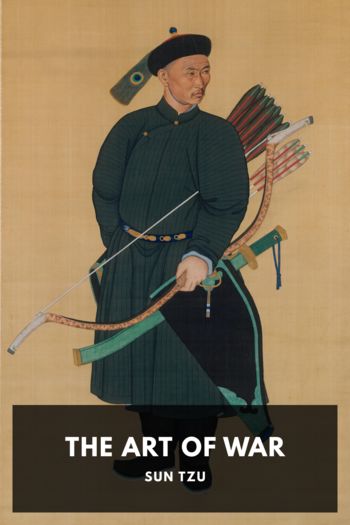The Art of War, Sun Tzu [best english books to read for beginners TXT] 📗

- Author: Sun Tzu
Book online «The Art of War, Sun Tzu [best english books to read for beginners TXT] 📗». Author Sun Tzu
In point of literary style, Sun Tzǔ’s work belongs to the same school as Kuan Tzǔ,56 Liu Tʽao,57 and the Yüeh Yü,58 and may have been the production of some private scholar living towards the end of the “Spring and Autumn” or the beginning of the “Warring States” period.59 The story that his precepts were actually applied by the Wu State, is merely the outcome of big talk on the part of his followers.60
From the flourishing period of the Chou dynasty61 down to the time of the “Spring and Autumn,” all military commanders were statesmen as well, and the class of professional generals, for conducting external campaigns, did not then exist. It was not until the period of the “Six States”62 that this custom changed. Now although Wu was an uncivilized State, is it conceivable that Tso should have left unrecorded the fact that Sun Wu was a great general and yet held no civil office? What we are told, therefore, about Jang-chu63 and Sun Wu, is not authentic matter, but the reckless fabrication of theorizing pundits. The story of Ho Lü’s experiment on the women, in particular, is utterly preposterous and incredible.64
Yeh Shui-hsin represents Ssǔ-ma Chʽien as having said that Sun Wu crushed Chʽu and entered Ying. This is not quite correct. No doubt the impression left on the reader’s mind is that he at least shared in these exploits; but the subject of the verbs 破, 入, 威 and 顯 is certainly 闔廬, as shown by the next words: 孫子與有力焉.65 The fact may or may not be significant; but it is nowhere explicitly stated in the Shih Chi either that Sun Tzǔ was general on the occasion of the taking of Ying, or that he even went there at all. Moreover, as we know that Yüan and Po Pʽei both took part in the expedition, and also that its success was largely due to the dash and enterprise of 夫㮣 Fu Kai, Ho Lu’s younger brother, it is not easy to see how yet another general could have played a very prominent part in the same campaign.
陳振孫 Chʽên Chên-sun of the Sung dynasty has the note:—66
Military writers look upon Sun Wu as the father of their art. But the fact that he does not appear in the Tso Chuan, although he is said to have served under Ho Lü King of Wu, makes it uncertain what period he really belonged to.67
He also says:—
The works of Sun Wu and Chʽi may be of genuine antiquity.68
It is noticeable that both Yeh Shui-hsin and Chʽên Chên-sun, while rejecting the personality of Sun Wu as he figures in Ssǔ-ma Chʽien’s history, are inclined to accept the date traditionally assigned to the work which passes under his name. The author of the Hsü Lu fails to appreciate this distinction, and consequently his bitter attack on Chʽên Chên-sun really misses its mark. He makes one of two points, however, which certainly tell in favor of the high antiquity of our “13 chapters.” “Sun Tzǔ,” he says, “must have lived in the age of Ching Wang [519–476], because he is frequently plagiarized in subsequent works of the Chou, Chʽin and Han dynasties.”69 The two most shameless offenders in this respect are Wu Chʽi and Huai-nan Tzǔ, both of them important historical personages in their day. The former lived only a century after the alleged date of Sun Tzǔ, and his death is known to have taken place in 381 BC. It was to him, according to Liu Hsiang, that 曾申 Tsêng Shên delivered the Tso Chuan, which had been entrusted to him by its author.70 Now the fact that quotations from the Art of War, acknowledged or otherwise, are to be found in so many authors of different epochs, establishes a very strong anterior to them all—in other words, that Sun Tzǔ’s treatise was already in existence towards the end of the 5th century BC. Further proof of Sun Tzǔ’s antiquity is furnished by the archaic or wholly obsolete meanings attaching to a number of the words he uses. A list of these, which might perhaps be extended, is given in the Hsü Lu; and though some of the interpretations are doubtful, the main argument is hardly affected thereby.71 Again, it must not be forgotten that





Comments (0)